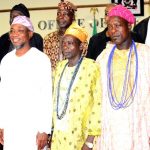
Leveraging e-learning For More Inclusive Education
 The continued disruption of academic activities in parts of Nigeria’s north-east region occasioned by insecurity in the area provides good grounds to make a case for wide application of electronic learning (e-learning) in Nigeria, much as did the outbreak of Ebola Virus Disease (EVD) in the country mid-2014.
The continued disruption of academic activities in parts of Nigeria’s north-east region occasioned by insecurity in the area provides good grounds to make a case for wide application of electronic learning (e-learning) in Nigeria, much as did the outbreak of Ebola Virus Disease (EVD) in the country mid-2014.
E-learning refers to the use of electronic media, educational technology and Information Communication Technology (ICT) in education. It includes numerous types of media, which deliver text, audio, images, animation, and streamed video, and incorporates applications and processes such as audio or video tape, satellite television, and computer-based learning, as well as local intranet/extranet and web-based learning.
Indeed, even in the absence of EVD or insecurity, the need for e-learning in the country cannot be glossed over. Nigeria is facing one of the world’s worst learning crises and desperately needs to rethink education, according to experts. Rapid population growth has meant that there are now more than 10 million out-of-school children in the country – one in five of the global total, according to statistics. This is besides the over 194,664 students who have been forced to stay out of school due to insecurity, according to an independent assessment conducted by the Coalition of Civil Society Groups (CCSG).
Nigeria needs almost 400,000 new teachers this year in order to achieve universal primary education, according to the United Nations (UN). But experts say ICT makes it easier to reach students than traditional teaching methods. And we agree. By making use of e-learning platforms, children could have access to quality and efficient education at home.
We also agree with Chris Uwaje, former president, Institute of Software Practitioners of Nigeria (ISPON), who said that Nigeria needs “to create electronic schools, and electronic learning (e-learning) platforms and effective strategies for these children”. That is the way the world is going. That is the way Nigeria must go.
Thankfully, there is a model. Rauf Aregbesola, governor of Osun State, sometime ago introduced Opon Imo, Table of Knowledge, a device his government has been distributing free to secondary school students in its public schools. Opon Imo is loaded with textbooks, tutorials, tests and Tetris. Part of its innovativeness lies in the use of technology to democratise and complement education. The device has made it possible for students to learn outside of the classroom.
Such a device offers several advantages. Coupled with the latest technology, it has been ‘tropicalised’, i.e., it is designed to tackle local learning problems with modern technology. For instance, the device is solar-powered and students can learn at their own pace.
This approach – harnessing technology to allow students to learn at their own rate and away from the school – was pioneered by Khan Academy, a not-for-profit organisation based in the US. Students with a computer and internet access can connect to Khan Academy’s library of videos, interactive challenges and assessments with real-time reports on their performance. But unlike the US, most Nigerians first access to the internet will be through a handheld device: a smartphone or a tablet. Opon Imo thus exemplifies thinking global and acting local.
Digital media is changing what and how people learn; an informal knowledge society is emerging. Learning is no longer dependent on teacher, time, location and situation. The role of teachers, too, will change. A UNESCO paper, ‘Education and skills for inclusive and sustainable development beyond 2015’, notes that teachers will change from “dispensers of information and knowledge to facilitators and enablers of learning”.
Nigeria and its handlers must take this matter more seriously. No doubt, the true future of Nigeria is its youth, particularly if they are given robust intellectual, physical and spiritual formation. Ideas generated from their knowledge and machines they design, make or tinker with, are far more important to Nigeria’s progress than the vast natural resources buried underneath Nigeria.



